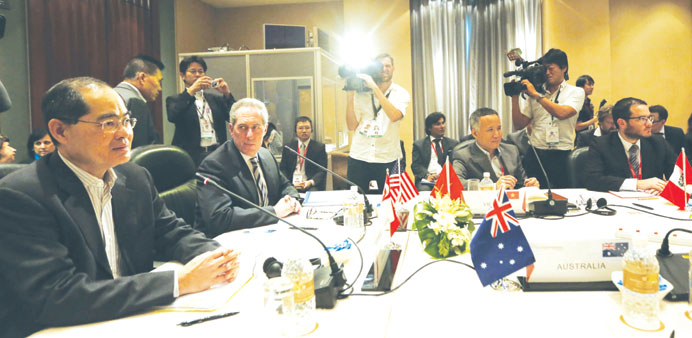Singapore Minister for Trade and Industry, Lim Hng Kiang (left) speaks as US trade representative Michael Froman (2nd from left) listens during the Trans-Pacific Partnership Ministerial Meeting in Singapore.
AFP
Talks on forming a huge US-led Pacific free trade area will resume next month after the 12 prospective members yesterday gave up on meeting Washington’s year-end deadline for a deal.
US Trade Representative Michael Froman and his counterparts said they made “substantial progress” after four days of talks in Singapore on the proposed Trans-Pacific Partnership (TPP) but failed to resolve all issues.
“We have decided to continue our intensive work in the coming weeks toward such an agreement,” Froman said, reading a joint statement by the trade ministers.
“Following additional work by negotiators, we intend to meet again next month,” said the statement, which capped secretive talks denounced by activists as a US attempt to railroad a deal.
The TPP is being negotiated by Australia, Brunei, Canada, Chile, Japan, Malaysia, Mexico, New Zealand, Peru, Singapore, the US and Vietnam.
They make up 40% of the global economy and other countries may join the pact later.
The ministers had arrived in Singapore from the just-concluded World Trade Organisation talks in the Indonesian island of Bali.
President Barack Obama has hailed the TPP as a centrepiece of renewed US engagement in Asia, saying it contains market-opening commitments that go well beyond those in other free-trade accords. The TPP talks also cover areas not included in other pacts, such as the environment and labour standards.
But the complexity of the issues already caused negotiators to miss the original 2012 deadline set by Obama to reach a deal. They have been divided on a number of issues, including opening up Japan’s auto and farm markets, government procurement and limiting the role of state-owned enterprises - said by some countries to distort competition.
Patent issues – in particular on medicines – have also been a sticking point.
US negotiators, backed by the powerful pharmaceuticals industry, want drug companies to get longer patent protection for a new class of drugs called “biologics” which are developed from living tissue. Drug firms say this is necessary to allow them to recoup investments and continue research into fresh cures.
But campaign groups like humanitarian organisation Medecins Sans Frontieres (Doctors Without Borders) say such patent protection would restrict access to cheaper generic drugs for millions of poor people.
Activists monitoring the TPP talks hailed the failure to meet the deadline.
Jamie Choi, campaign director of global advocacy group Avaaz, said: “The US was hellbent on sealing the super-secretive deal this week, but people across the world have blown these talks open, and we’re seeing countries standing strong for what their citizens want.”
Choi added: “People power is seeing off big business bullies – it’s great news for democracy.”
Lori Wallach, director of Public Citizen’s Global Trade Watch, reiterated the group’s demand for greater transparency.
“At this stage, the draft TPP text must be released so those of us who will live with the results can know just what was this so-called ‘progress’ entailed, and at whose expense,” Wallach said.
But US trade chief Froman, who was described by Australian Trade Minister Andrew Robb as a “very hard taskmaster”, called the Singapore meeting “tremendously successful and productive”.

